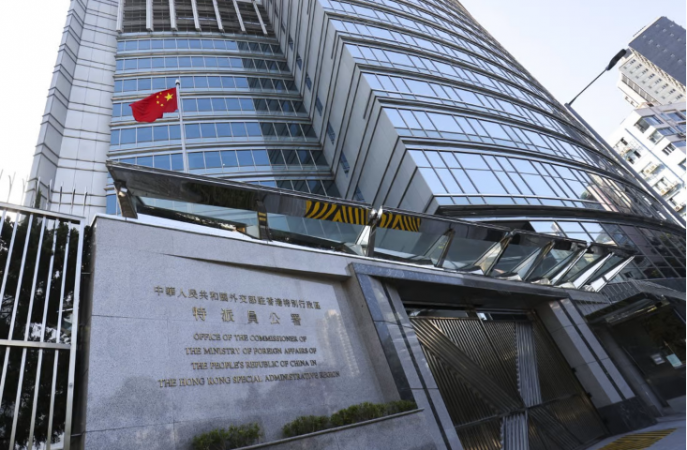
BEIJING: According to several diplomats based in Hong Kong, they are still deciding how to respond to China's foreign ministry's "unusual" request for information about the real estate of their consulates in the region.
A reminder was sent by the Commissioner's Office of the Chinese Foreign Ministry stating that "the Chinese side is registering the properties of consular missions and representative offices of international organizations in Hong Kong".
Also Read: China conducts anti-submarine exercises as neighbors beef up their underwater forces
The letter, which was sent on 31 August as a follow-up to the one sent in June, requested information on properties that would be used by consulates to "residence the Vice-Chancellor, and the Heads of Missions and Mission Staff, and for construction." used as land". ,
The ministry's office requested information on the date of the mission's opening, the method and date of purchase or lease, and whether the properties were "used for other purposes."
The August reminder stated that the notice was due on September 22, but did not specify any penalties for non-compliance.
It was impossible to speak immediately with a spokesman for a Foreign Commissioner's Office. The Basic Law, the mini-constitution of Hong Kong, gives the central government control over the territory's foreign relations.
The sale of United States consulate assets did not go as planned in 2020 because China said its approval was required earlier. According to Wang Wenbin, a spokesman for the Ministry of Foreign Affairs in Beijing, at the time, the application was required "in light of US regulations on the management of the registered assets of foreign missions in the United States and based on the principle of reciprocity."
The most recent notice did not state the need for Beijing's approval for the sale of the property.
In response to the request, the British Consulate declined to comment, other than noting that it was not customary to discuss operational issues that were subject to diplomatic privilege. The Canadian consulate also declined to comment.
Also Read:RBI mulling extensive use of Artificial Intelligence to improve regulatory supervision
According to a former diplomat from Asia, the Chinese request is "clumsy" and may even be "adverse".
The envoy stressed, "I believe this is likely to intimidate and upset the diplomatic community and as a very gentle reminder that Hong Kong's limits to acceptable conduct by diplomats have changed."
"I doubt it will work," said one observer. "Those very few consulates, mostly Westerners, will not stop supporting the way the Chinese fear 'democracy' or condemning Chinese abuses of human rights in Hong Kong, while most consulates that have no intention of doing so." Wasn't. Just getting angry."
To commemorate the action at Tiananmen Square in Beijing 33 years ago, the US, Finland and the European Union lit candles on June 4 and put them on the windows of their Hong Kong offices. He then posted the images on his social media pages.
The consulates of Canada and Australia also shared messages to commemorate the occasion, and some EU member states shared posts from Brussels. In response, the Ministry of Foreign Affairs' office gave "serious representation" to several Western consulates.
A diplomat based in Hong Kong described the notice as "quite unusual" and said his office was investigating whether Beijing had requested information of a similar nature from missions operating in mainland China.
He said his consulate was still deciding how to comply, but a possible course of action was to seek reciprocity from Chinese diplomats or representatives stationed at the Hong Kong Economic Trade Office abroad.
The property was believed to be on the territory of the country, and according to the third senior diplomat, the consulate was "under no obligation to share any information," making the request "very, very out of the ordinary".
According to Chinese university international relations expert Wilson Chan Wai-shun, the host country has the right to request such things under the Vienna Convention on Consular Relations, but time is bound to create rumours.
He said that if the Ministry of External Affairs decides to act after receiving the information, it may even worsen the situation as it will take up the issue diplomatically.
Veteran China observer Lau Siu-kai, vice-president of the Chinese Association of Hong Kong and Macau Studies, a semi-official think tank, cautioned against reading too much into Beijing's intentions and said such requests were not unusual.
"If Beijing makes no further requests, the rumors will stop. In order to strengthen Hong Kong's status as an international city, Beijing wants to see more foreign missions there," he said.
The Government of Canada has previously requested information from the heads of diplomatic missions, along with information about their residential addresses, contact information and official assets, from all accredited foreign representatives.
On its website, the Canadian government's department of foreign affairs also requested "current floor plans and photographs of all official properties, including diplomatic and consular offices and their respective residences, as well as a list of persons mandated to interact professionally with Canada's national police force and other Canadian law enforcement officials at these sites." But participation was optional.
In the United States, all property acquisitions by foreign missions, including leases, additions, and sales, can be managed by the Department of State's Office of Foreign Missions to ensure that they are compliant with applicable local and international law, national security interests, and reciprocity.
Foreign governments aren't allowed to buy real estate for their diplomatic or consular posts if they don't grant the US substantially equivalent property rights.